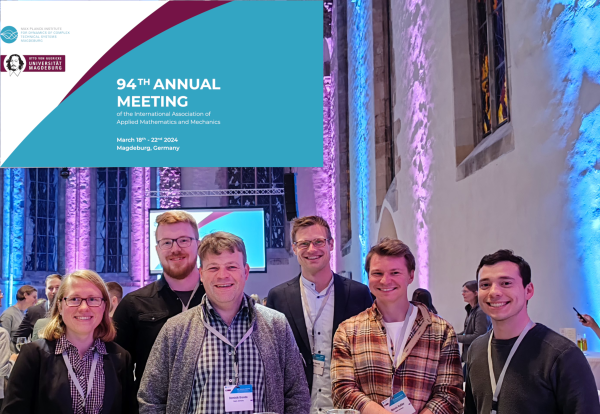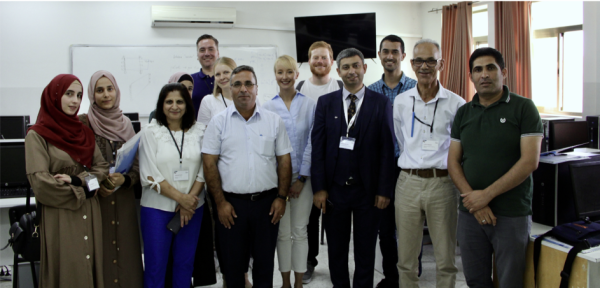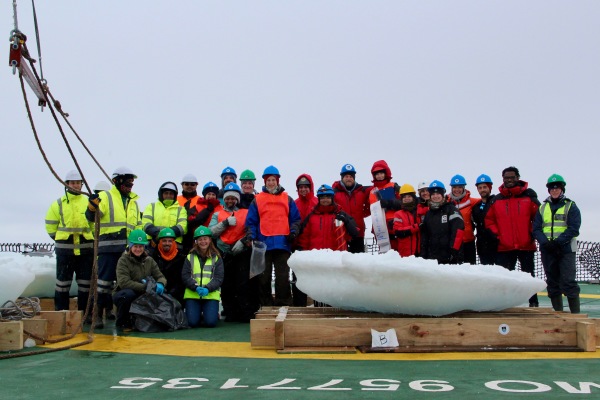Mechanics
SUMMER TERM 2025
The overview of the modules in Summer Term 2025 including the moodle courses can be found in the teaching section.
The institute has moved ... Mechanics in new rooms
Since mid-September 2022 the Institute of Mechanics can be found in new rooms.
We are now located in building R12 on the second floor S02 (above the glass pavilion at the red café).
Welcome to the Institute of Mechanics The Institute

The field of activity of the Institute of Mechanics is the theoretical and computer-based mechanics. Thereby, aspects of material modeling and the further development of the Finite Element Method are the main focus. Prof. Dr.-Ing. Jörg Schröder and his employees offer teaching of engineering mechanics 1-3, continuum mechanics, theory of materials as well as the linear and non-linear finite element method. teaching
Several projects founded by the DFG enable a wide networking regarding the research: The project "Parallel simulations of arterial walls: continuum mechanical modelling and numerical solution using FETI domain decomposition" is elaborated in cooperation with the faculty of medicine and the chair of numerical mathematics. The project "Statistically similar representative microstructures in elasto-plasticity" is realized within the DFG research group "Analysis and computation of microstructure in finite plasticity" (FG797). Further projects are "Construction and analysis of anisotropic polyconvex energy functions" and "Freezing and thawing of saturated porus media". The institute has successfully applied phenomenological material models for the macroscopic description of dual-phase steels to different sheet metal forming problems. Beyond that the research in the field of functional materials like piezoelectrica and ferroelectrica (FG 1509) are current topics as well as the development of new mixed finite elements or improved least-squares finite element. research
Announcements/Notifications

January 2025: Prof. Huiling Duan, Ph.D. Visit of AvH Research Award Winner
In January 2025, Prof Huiling Duan, Ph.D. will visit the Institute of Mechanics. Initiated by the presentation of the Alexander von Humboldt Foundation Research Award in November 2023, the joint research projects are now being driven forward and expanded.
Prof. Huiling Duan is a Boya Chair Professor and the Dean of the College of Engineering at Peking University, a member of the Chinese Academy of Sciences, a fellow of the American Society of Mechanical Engineers (ASME). Her main research interests lie in interface mechanics and fluid-structure interaction mechanics. She published more than 240 peer-reviewed papers in Nature Commun., Science Advances, Proc. Natl. Acad. Sci., Phys. Rev. Lett., etc.
Beside the Humboldt Research Award of Germany she has received prestigious awards including the second prize of the State Natural Science Award, National Innovation Award of China, National Outstanding Young Scholar of China National Outstanding Young Female Scientist of China, etc. Currently, she serves as Member of the International Union of Theoretical and Applied Mechanics (IUTAM) Symposia Panel for Solid Mechanics, Executive Member of Global Engineering Deans Council.

July 2024: 16th World Congress on Computational Mechanics and 4th Pan American Congress on Computational Mechanics WCCM - PANACM 2024
The 16th World Congress on Computational Mechanics and 4th Pan American Congress on Computational Mechanics took place in Vancouver (Canada) from 21 to 26 July 2024 at the Vancouver Convention Centre. The Institute of Mechanics was able to present its current research results to a broad specialist audience with four lectures. In addition, Prof. Dr Jörg Schröder organised the mini-symposium Advanced materials and smart structures: Modelling, simulation and testing together with Prof. Dr Michael Kaliske (TU Dresden, Germany).

June 2024: "Multi-Field Problems Across Different Scales - Materials for the Development of Green Technologies" 27th CISM-IUTAM International Summer School
The 27th CISM-IUTAM International Summer School on ‘Multi-Field Problems Across Different Scales - Materials for the Development of Green Technologies’ was held at the International Centre for Mechanical Sciences (CISM) in Udine, Italy, from 24-28 June 2024 under the direction of Prof. Dr Michele Marino and Prof. Dr Jörg Schröder. In addition to the lectures by the course leaders, participants were able to attend lectures by Prof Dr Vikram Deshpande, Prof Dr Laurent Stainier, Prof Dr Heiko Wende and Prof Dr Hongbin Zhang. Institute members Dr Maximilian Reichel and Usama Ashfaq were also among the participants.

June 2024: Doctorate for Mr Serdar Serdas Congratulations Serdar Serdas
On 12 June 2024, the defence of the dissertation "Modeling of the actuation and sensing behavior of an ionic polymer-metal composite within the framework of the Theory of Porous Media" by Mr Serdar Serdas took place. He was successfully awarded his doctorate under the chairmanship of Prof Dr Jörg Schröder together with the reviewers Prof Dr Joachim Bluhm and Prof Dr Bernd Markert and the examiners Prof Dr Doru Lupascu and Prof Dr Eugen Perau. We wish Dr Serdas Serdas all the best for the future.

June 2024: 9th European Congress on Computational Methods in Applied Sciences and Engineering ECCOMAS 2024
The 9th European Congress on Computational Methods in Applied Sciences and Engineering took place in Lisbon (Portugal) from 3 to 7 June 2024 at the Lisbon Congress Centre. The Institute of Mechanics presented the latest results from ongoing research activities to an international audience of experts in five presentations.

March 2024: 94th Annual Meeting of the International Association of Applied Mathematics and Mechanics GAMM 2024
The annual conference of the 94th Annual Meeting of the International Association of Applied Mathematics and Mechanics (GAMM 2024), which took place at Otto von Guericke University Magdeburg from 18 to 22 March 2024, came to a successful conclusion. The Institute of Mechanics presented a whole range of current research work. A total of 6 lectures were held: Experienced scientists as well as young PhD students presented new scientific developments of the institute. See you next year at the GAMM annual conference in Poznan in neighbouring Poland!
9th GACM Colloquium on Computational Mechanics 2022
Essen, Germany
Colloquium Chairpersons
D. Brands, H. Gravenkamp, L. Scheunemann, C. Schwarz, A. Schwarz
The 9th GACM Colloquium on Computational Mechanics for Young Scientists from Academia and Industry will take place from 21st to 23rd September 2022 in Essen, Germany. The colloquium is jointly hosted by the Institute of Structural Analysis of Plates and Shells and the Institute of Mechanics at the University of Duisburg-Essen.
The GACM Colloquium is a biennial conference that brings together young researchers in the field of computational mechanics. This event provides excellent opportunities for students and postdocs to present their work, acquire new knowledge in the field of numerical modeling in engineering and science, and to establish a network of colleagues and peers. The colloquium consists of mini-symposia — organized by selected young scientists — as well as a poster session and several plenary lectures.
We are pleased to announce the plenary lectures given by Prof. Swantje Bargmann (BU Wuppertal), Prof. Laura De Lorenzis (TU Braunschweig), Prof. Marc-André Keip (U Stuttgart) and Prof. Otto von Estorff (TU Hamburg).
We would like to invite you to attend the 9th GACM Colloquium. Detailed information will be announced here soon.
Work Group Seminar Kevelaer

From 3rd to 6th February 2020 our annual work group seminar took place in the Priest House Kevelaer. Together with colleagues from mathematics at the University of Cologne, mathematics at the Freiberg University of Mining and Technology and mechanics at the Ruhr-University Bochum we met to give lectures and present posters. The seventh working group seminar was a great success with many fruitful discussions and an intensive exchange between the groups.
Curious about ice Summer School in Cape Town
What effects does climate change have on the ice masses in the marginal ice zone of the Antarctic and on which topics are currently being researched in the Antarctic? In order to answer these and other questions about the Antarctic and to give students from different countries the opportunity to better study the conditions in the Antarctic, an international Summer School was held at the UCT Cape Town from 22-28 January. Students and lecturers from the University of Duisburg-Essen were among the participants. The event was organized in cooperation between the University of Uppsala and the University of Cape Town.
 The progress of climate change in the Arctic is widely reported in the media. Everybody knows the pictures of ice masses breaking and falling into the water at the North Pole, but what is the situation in the southern hemisphere? The Summer School in Cape Town gave 22 participants the opportunity to get to the bottom of these and other questions. The students had the opportunity to compare the differences in conditions between the Arctic and Antarctic. Over five days, insights were provided into important topics that are necessary to understand the marginal ice zone of the Antarctic. The Marginal Ice Zone is the transition between the open ocean and a closed ice cover. Topics included climate models, the interaction of ocean, ice, and atmosphere, large and small scale simulations of sea ice dynamics, sea ice growth, predictions of iron development and algae growth. The different thematic blocks made it clear that these cannot be considered in isolation from each other, as each thematic area has complex interactions with the others. After the theories of the different areas were presented in the morning, in the afternoon there was the opportunity to do research on small projects. A highlight was the hands-on in the polar laboratory of the University of Cape Town. The students measured temperature profiles and the elasticity modulus of the ice samples. The determined modulus of elasticity, which indicates the stiffness of a material, is necessary, among other things, to assess and simulate large ice fields in Antarctica. The Summer School builds on the existing cooperation between the participating universities, in the context of which researchers from the University of Duisburg-Essen have already participated twice in expeditions to the marginal ice zone of Antarctica. "We are pleased about the good cooperation with the University of Cape Town", said Professor of the Institute of Mechanics, Jörg Schröder. His colleague and head of the Institute of Materials Science Doru C. Lupascu added: "The Summer School offered students and lecturers the opportunity to intensively exchange views on Antarctic research across the continents".
The progress of climate change in the Arctic is widely reported in the media. Everybody knows the pictures of ice masses breaking and falling into the water at the North Pole, but what is the situation in the southern hemisphere? The Summer School in Cape Town gave 22 participants the opportunity to get to the bottom of these and other questions. The students had the opportunity to compare the differences in conditions between the Arctic and Antarctic. Over five days, insights were provided into important topics that are necessary to understand the marginal ice zone of the Antarctic. The Marginal Ice Zone is the transition between the open ocean and a closed ice cover. Topics included climate models, the interaction of ocean, ice, and atmosphere, large and small scale simulations of sea ice dynamics, sea ice growth, predictions of iron development and algae growth. The different thematic blocks made it clear that these cannot be considered in isolation from each other, as each thematic area has complex interactions with the others. After the theories of the different areas were presented in the morning, in the afternoon there was the opportunity to do research on small projects. A highlight was the hands-on in the polar laboratory of the University of Cape Town. The students measured temperature profiles and the elasticity modulus of the ice samples. The determined modulus of elasticity, which indicates the stiffness of a material, is necessary, among other things, to assess and simulate large ice fields in Antarctica. The Summer School builds on the existing cooperation between the participating universities, in the context of which researchers from the University of Duisburg-Essen have already participated twice in expeditions to the marginal ice zone of Antarctica. "We are pleased about the good cooperation with the University of Cape Town", said Professor of the Institute of Mechanics, Jörg Schröder. His colleague and head of the Institute of Materials Science Doru C. Lupascu added: "The Summer School offered students and lecturers the opportunity to intensively exchange views on Antarctic research across the continents".
AGYA Summer School in Hebron and Bethlehem
From 17 to 22 August 2019 Dr.-Ing. Lisa Scheunemann and Dr.-Ing. Alexander Schwarz were invited as lecturers at the AGYA Summer School in "Numerical Simulations" at the Palestine Polytechnic University in Hebron in the West Bank. The twelve courses consisting of lectures and programming exercises covered the basics of the Finite Element Method. The Summer School equips students from different disciplines such as Math, Physics, Chemistry, Environmental, Health and Aerospace Engineering with know-how on the topics of continuum mechanics, numerical methods for solids and fluids, iterative solvers and error estimates. The event is organized by the Arab-German Young Academy of Sciences and Humanities (AGYA) in cooperation with Palestine Polytechnic University (PPU), Bethlehem University (BU), and Palestine Academy for Science and Technology (PALAST).


Group picture at AGYA Summer School 2019 in Hebron.
Scientists on their way into the Antarctic ice - SCALE Winter Cruise 2019 A journey into the Antarctic sea ice
In July and August 2019, four scientists from University of Duisburg-Essen embarked on a three-week expedition to the Southern Ocean and the Marginal Ice Zone (MIZ) of Antarctica. Together with 100 scientists from 13 nations, they travelled on the South African research vessel S.A. Agulhas II to investigate the properties of sea ice in numerous experiments.

Sea Ice Team on the winter cruise 2019 with a small pancake on the heli-deck. ©Sea Ice Team, SCALE Winter Cruise 2019.
The scientists Dr.-Ing. Tommy Mielke, Felix Paul, B.Sc. from the Institute of Material Sciences, as well as Prof. Jörg Schröder and Dr.-Ing. Carina Nisters from the Institute of Mechanics were part of an interdisciplinary project funded by the SA National Antarctic Project (Southern Ocean Seasonal Experiment – SCALE) to investigate the conditions in the Antarctic region in particular during the winter months.
The Earth's polar regions are covered by sea ice, which is driven by atmospheric movements, wave movements and ocean currents and is subject to constant dynamics. Sea ice plays an important role in determining the polar climate and is believed to have a significant impact on the global climate. The forces within the agglomerate of the ice lead to the formation of pancake ice. The exploration of this region is an important task for many scientific and engineering disciplines.
The multidisciplinary research project of the Cruise was led by Professor Marcello Vichi, the director of the Department of Oceanography at University of Cape Town (UCT), and included 17 different research groups with different research interests in biology, chemistry and engineering. The Sea-Ice team led by Professor Sebastian Skatulla (UCT) was one of the research teams. The Sea-Ice group successfully took cores from both consolidated and pancake ice. These cores are used to determine the physical and mechanical properties of the ice. Strength tests, tests of thermal conductivity and salt content as well as hardness tests were carried out. In addition, samples of the so-called frazil ice were taken using equipment specially designed for this expedition. Frazil ice is a mixture of ocean salt water and the first crystalline structures of ice between the ice floes. In addition to salt content and temperature, viscosity was measured for this mixture. Electro engineers were also part of the Sea Ice team, who measured the movements of the ice floes using buoys. Another project was the observation of sea ice movements to define the limits of the MIZ.

Brazilian top researchers visits the Institute of Mechanics
Two women researchers and six male colleagues will receive this year’s Georg Forster Research Awards, granted by the Alexander von Humboldt Foundation. The award targets research personalities from transition and developing countries whose research to date has earned them international visibility whilst seeking to help solve development-related issues. The award winners are invited to spend time in Germany establishing and building collaborations with colleagues here. Valued at 60,000 EUR each, the research awards are financed by the Federal Ministry for Economic Cooperation and Development
One of the award winners, Paulo De Mattos Pimenta (60), will be a frequently scientific visitor at the Institute of Mechanics in the coming years. His first stay at the institute will be in March/April 2015. The Brazilian, who is actually a professor at the Universidade de São Paulo, is considered a pioneer of computational mechanics, working in strongly practice-related fields. He has developed methods of numerical analysis for numerous engineering projects in Brazil, including the construction of the Brasilia National Stadium for the 2014 World Cup. De Mattos Pimenta, who holds a professorship at the University of São Paulo, aims to strengthen long-term cooperation with the Institute of Mechanics at the University of Duisburg-Essen.
(Source: http://www.humboldt-foundation.de/web/Pressemitteilung-2014-36.html)
Press release of the UDE in the WAZ (6.1.2015)
Press release of the UDE in the RP (29.1.2015)
Read moreFurther Links to our Research Activities
- DFG-Forschergruppe 1509 "Ferroische Funktionsmaterialien - Mehrskalige Modellierung und experimentelle Charakterisierung"
- DFG Schwerpunktprogramm (SPP) 1568 "Design and Generic Principles of Self-healing Materials"
- DFG Schwerpunktprogramm (SPP) 1648 "Software for Exascale Computing" (SPPEXA)
- DFG Schwerpunktprogramm (SPP) 1748 "Reliable Simulation Techniques in Solid Mechanics. Development of Non-standard Discretization Methods, Mechanical and Mathematical Analysis "
- DFG Schwerpunktprogramm (SPP) 2013 "Gezielte Nutzung umformtechnisch induzierter Eigenspannungen in metallischen Bauteilen"
- DFG Schwerpunktprogramm (SPP) 2020 "Zyklische Schädigungsprozesse in Hochleistungsbetonen im Experimental-Virtual-Lab"
- Förderung des individuellen Lernerfolgs mittels digitaler Medien im Bauingenieurstudium – FUNDAMENT

